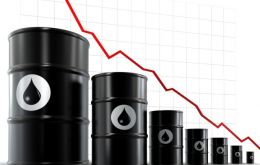MercoPress. South Atlantic News Agency
Tag: Oilprice.com
-
Friday, November 14th 2014 - 07:13 UTC
Early signs of a pullback in drilling activity

With oil prices low and showing no sign of an immediate rebound, the industry is beginning to pull back on spending. Oil prices have dropped around 30% since summer highs, raising fears among producers across the globe.
-
Wednesday, November 5th 2014 - 06:43 UTC
The end of an era: Is the US petrodollar under threat?

Recent trade deals and high-level cooperation between Russia and China have set off alarm bells in the West as policymakers and oil and gas executives watch the balance of power in global energy markets shift to the East.
-
Thursday, October 23rd 2014 - 21:26 UTC
Slumping oil prices are putting pressure on U.S. shale operations

The number of active rigs drilling for oil and gas fell by their most in two months, according to the latest data from oil services firm Baker Hughes. There were 19 oil rigs that were removed from operation as of Oct. 17, compared to the prior week. There are now 1,590 active oil rigs, the lowest level in six weeks.
-
Friday, October 3rd 2014 - 21:00 UTC
The world's 10 biggest energy gluttons

Next time you get into your car and drive to the supermarket, think about how much energy you consume on an annual basis. It is widely assumed that Westerners are some of the world's worst energy pigs. While Americans make up just 5% of the global population, they use 20% of its energy, eat 15% of its meat, and produce 40% of the earth's garbage.
-
Tuesday, September 30th 2014 - 22:01 UTC
Fed up with US federal inaction, states act alone on Cap-and-Trade

Unsatisfied with the pace at which the federal government is acting to reduce greenhouse gas emissions, several U.S. states and a few Canadian provinces are forging ahead with their own initiatives.
-
Thursday, September 11th 2014 - 05:14 UTC
Islamic State's ultimate goal: Saudi Arabia's oil wells

For the terrorist group known as the Islamic State, Syria and Iraq were a good place to start their campaign, but in order to survive and prosper it knew from the outset that it had no choice but to set its sights on the ultimate prize: the oil fields of Saudi Arabia.
-
Wednesday, September 3rd 2014 - 22:05 UTC
Soros signals Argentina’s shale is biggest place to be

One of the world’s legendary investors is upping his bet on Argentina’s shale oil and gas industry in a show of confidence for shale production in South America’s largest unconventional prize —and a big boost for both super-majors and smaller players making big waves in the heart of new discovery areas.
-
Tuesday, September 2nd 2014 - 20:01 UTC
Why the debate over energy storage utterly misses the point

The debate over which energy storage technology will prove to be the best in the long-term is woefully misguided. Many technologies have been tested in the field or been fully installed, but their real-world applications have created constant questions around a number of fixed themes: the three-points concern cost, technology, and potential environmental impact, as well as the need for specific regulation and end-of-life management.
-
Friday, August 29th 2014 - 06:49 UTC
New technology could end the debate over pipeline safety

Who could have ever imagined that North America would surpass Saudi Arabia as the world’s largest producer of oil and natural gas liquids? A decade ago, that would have seemed laughable. Yet that’s exactly what has happened; and it’s not just Saudi Arabia that has been left in North America’s dust -- Russia has, too.
-
Friday, August 22nd 2014 - 13:07 UTC
Unlikely bedfellows: mines that run on solar or wind power

Mining companies are often seen as dinosaurs when it comes to making changes that will benefit the environment, but that perception may be shifting as some companies turn to renewable energy to cut costs and lighten their carbon footprint.
